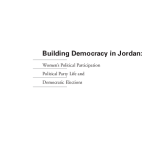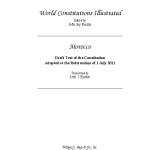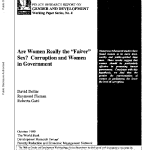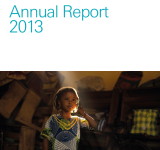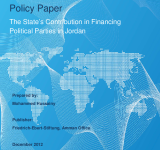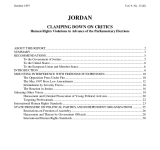parliament
يعد هذا التقرير حول التطور الديمقراطي في الأردن، واحدًا من أهم التقارير التي تمخض عنها مشروع الديمقراطية في العالم العربي الذي نفذته المؤسسة الدولية للديمقراطية والانتخابات بالتعاون مع شبكة المنظمات
يشير هذا التقرير إلى أنه كلما زادت مشاركة النساء وتمثيلهن في البرلمان كلما قل مستوى الفساد في الحكومة وزادت نزاهتها، وهي نتيجة تنسجم مع خلاصة العديد من الدراسات السلوكية التي وجدت أن النساء أكثر أهلاً
تناقش هذه المقالة الانتخابات النيابية التي أجريت في عام 1993 في الأردن، والتي كانت الانتخابات الثانية منذ بداية الانفتاح السياسي في أواخر الثمانينيات. كما تبحث في التطور الملحوظ في السياسة الأردنية
يناقش هذا التقرير الدور الذي لعبه الاتحاد البرلماني الدولي في توجيه الاهتمام لمنع النزاعات والكوارث، ويبحث في قضايا نزع السلاح ومنع انتشاره، والمصالحة السياسية، والكوارث الطبيعية، والتنمية المستدامة،
This paper examines issues concerning the state's financial contribution to political parties. It argues that the weakness of parties' financial resources limits their ability to engage in political activities and elections. The purpose of this paper is thus to provide a number of options and recommendation to help decision makers form the state's system for financing political parties. It aims to provide suitable financial support for each political party;; encourage the development of political parties in Jordan;; raise the political efficiency of political parties;; develop their organizational structures;; and motivate parties to participate in political life at national and local levels. This paper analyzes the positives and negatives of four financing options and;; based on this analysis;; presents a suggested system to assist decision makers as they design the state's financing mechanism for political parties.
Freedom of expression and press freedom are essential conditions for the conduct of free and fair elections. But in the pre-election period;; Jordanian authorities have used the laws in force;; and other means such as threats and intimidation by internal security forces and government officials;; to restrict free expression;; including press freedom;; in violation of the International Covenant on Civil and Political Rights (ICCPR);; which Jordan has ratified. This report documents a series of actions taken by the government to tame the print media -- including the temporary closure of thirteen weekly newspapers in September -- and intimidate political critics into silence. Journalists and editors told Human Rights Watch that they have followed a stricter regime of self-censorship since the amendments to the press law were implemented in May 1997;; for fear of being subjected to heavy financial penalties mandated under the new law. In addition;; students;; writers;; and researchers have faced a variety of sanctions -- ranging from detention;; criminal prosecution;; and imprisonment to harassment;; job loss;; and blacklisting -- because they expressed views on political subjects that the government preferred remain off-limits. Such measures have created an atmosphere in which the right to free expression is perceived by many in Jordan as under siege.

